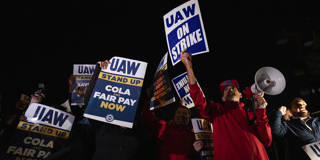As long as good jobs and workers’ rights are seen as optional add-ons in the fight against climate change, we will be waging a losing battle. As the United Auto Workers’ strike shows, new industrial strategies must do more to protect and empower the hard-working people who will be carrying them out.
NEW YORK – The United Auto Workers’ first-ever strike against the so-called “Big Three” (General Motors, Ford, and Chrysler-owner Stellantis) underscores the need to bring climate action, economic growth, and workers’ rights into alignment. Public policies aimed at increasing the production and sales of electric vehicles (EVs) have the power to catalyze innovation and private-sector investment in ways that benefit workers. But realizing that potential requires a new understanding of the role that both government and workers play in driving positive economic change at scale.

NEW YORK – The United Auto Workers’ first-ever strike against the so-called “Big Three” (General Motors, Ford, and Chrysler-owner Stellantis) underscores the need to bring climate action, economic growth, and workers’ rights into alignment. Public policies aimed at increasing the production and sales of electric vehicles (EVs) have the power to catalyze innovation and private-sector investment in ways that benefit workers. But realizing that potential requires a new understanding of the role that both government and workers play in driving positive economic change at scale.